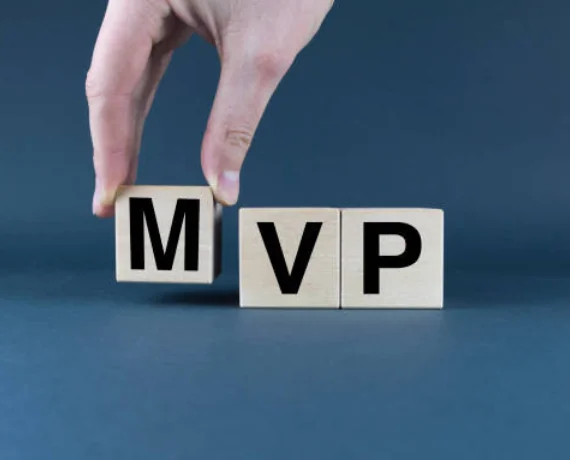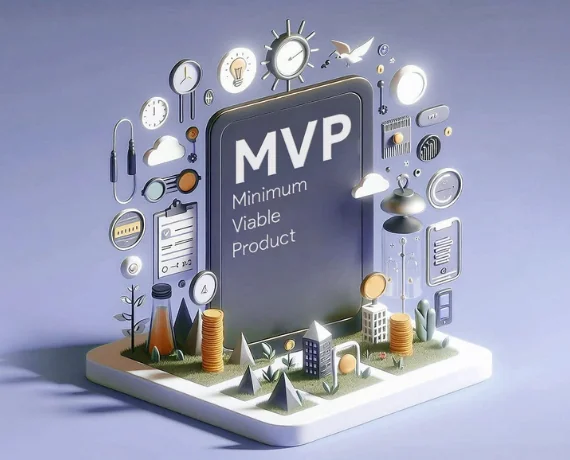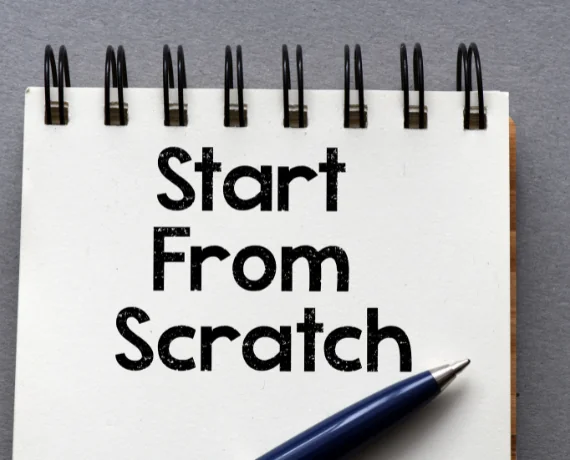Table of Content
- Introduction to MVP Travel Apps
- Who needs MVP for Travel?
- Why MVP is Crucial for Travel Development
- Benefits of Developing an MVP
- Understanding Target Audience
- Core Features of Travel MVP Software
- How to Prioritize Features for MVP
- Security and Simplicity
- Development Process and Launching
- Common Challenges and Solutions
- What should I know before hiring the right team?
Looking for a partner to develop MVP for Travel industry?
Book a callWhat if you could ensure your travel app project’s success by focusing on the essential steps of MVP travel development and preparing it for market competition? This strategic approach forms the basis of successful custom travel MVP software. One practical and realistic method that could be used is developing a Minimum Viable Product (MVP). An MVP for travel is an app where it only has the most important features needed in it as it will act as a base of your future app. By having an account, users can log in to access personal content and posts. It is important to log in to view posts and connect with others. This will enable you to test these features out, iron out any deficiencies, and ensure the product can work before reaching real customers. In this regard, MVP travel software development should be considered bearing in mind how sensitive travel apps are when it comes to bugs and flaws, especially third-party payment integrations. Anyway, find out how to develop MVP for hospitality.
Not sure whether you need a PoC, prototype, or an MVP for your travel product? Our article “PoC vs Prototype vs MVP” explains the differences.
Introduction to MVP Travel Apps
MVP Travel offers a range of travel apps designed to make planning and booking trips easier for clients. These apps provide a user-friendly interface that allows customers to effortlessly search and book upcoming trips, whether they are sports tours, family vacations, or business trips. With the MVP Travel app, clients can access a wealth of information on destinations, including detailed maps, comprehensive guides, and reviews from other travelers.
The app also enables users to interact with MVP Travel’s knowledgeable staff, who are always ready to provide personalized advice and support to help plan the perfect trip. By using the MVP Travel app, clients can take advantage of exclusive deals and discounts, making their travel experience even more enjoyable and cost-effective. Designed to provide a high level of service, the app features real-time updates, push notifications, and a secure payment system.
MVP Travel’s passion for delivering excellent travel experiences is evident in the app’s attention to detail and commitment to meeting the needs of its clients. Whether planning a family vacation, a business trip, or a sports tour, the MVP Travel app is the perfect tool to help make the experience unforgettable.
Who needs MVP for Travel?
1. Non-Technical Businesses
Most non-technical businesses within the travel industry face challenges in understanding and implementing complex technological solutions. For such types of businesses, an MVP designed for travel could come in handy. It provides them with a simplified version of the app that focuses on core functionalities. Hence they can validate their business ideas without necessarily having to invest heavily in full-scale development practices. For instance, if there were a travel agency looking forward to commencing offering online booking services, they would start with an MVP travel development so as to test market response and collect feedback. Non-technical businesses can leave the details to us and focus on their core operations.
2. Tech Startups in the Travel Industry
The development of an MVP for travel can be highly beneficial to tech startups operating within the realm of the tourism industry. Typically lacking resources or capital necessary to support large-scale development without validation makes startups need certainty around their product idea. Through this tool, start-ups MVP software development services can explore hypotheses, engage early adopters, and pivot based on real user feedback. For example, a start-up aiming at creating a new travel planning app can release an MVP for travel to gauge user engagement with and refine the product features.
Why MVP is Crucial for Travel Development
An MVP means creating a minimum viable version of your app that has only basic features just enough to satisfy early users and gather feedback for further development. This approach is highly recommended from the perspective of MVP travel development as it allows you to:
- Validate Your Idea. You can test to see if there is any demand before investing heavily in building MVP.
Planning to build a travel MVP? Our MVP Development Services help turn ideas into launch-ready products.
- Save Time and Money. Cut down on costs and time by concentrating on core functionalities only.
- Gather User Feedback. Early feedback enables you to understand what customers want.
- Reduce Risks. MVP travel development helps prevent costly mistakes during later stages of development by identifying early flaws and mending them.
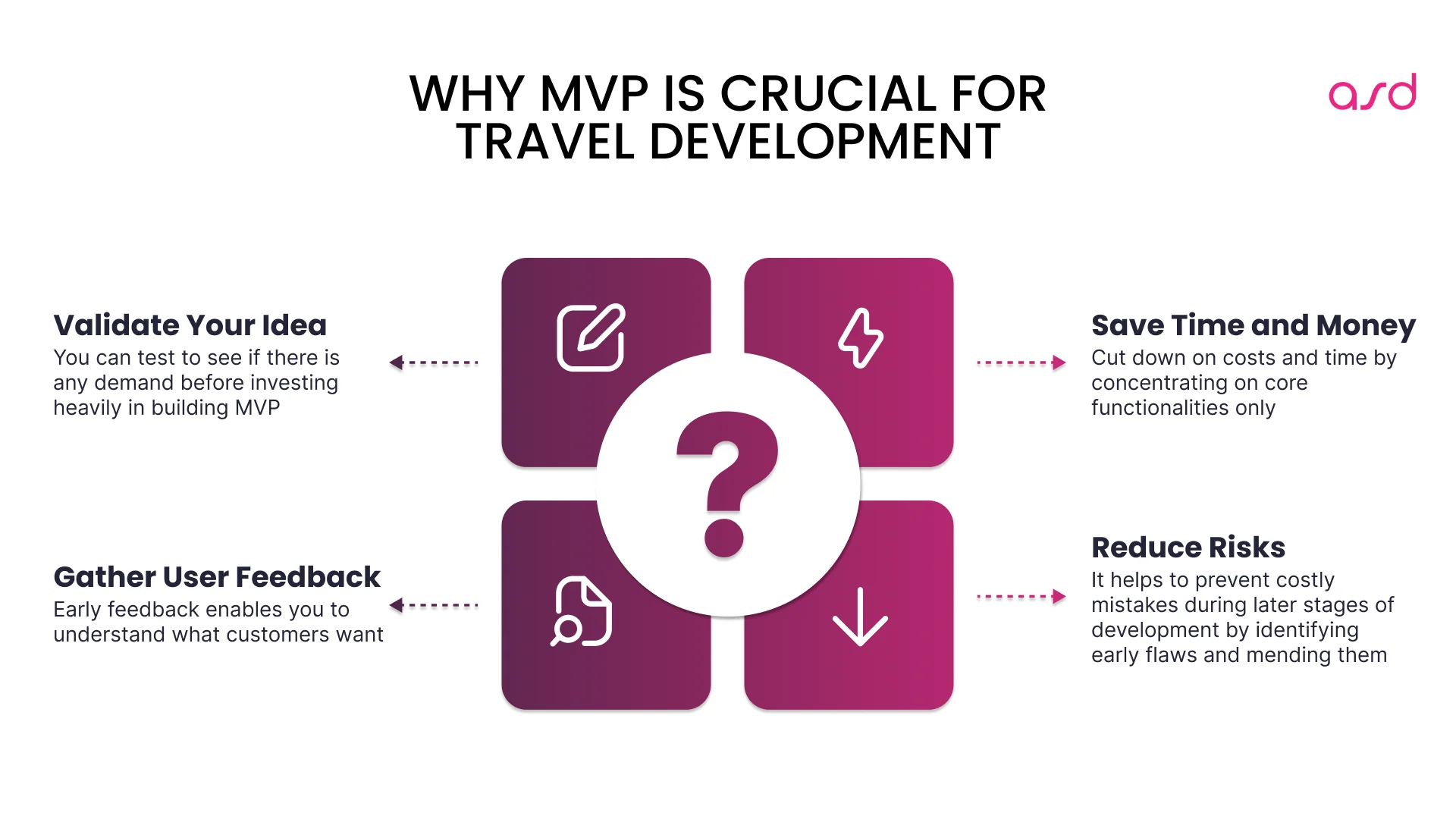
Benefits of Developing an MVP
Developing a Minimum Viable Product (MVP) is a crucial step in creating a successful travel app, as it allows for testing and refinement of the product before launch. By building an MVP, MVP Travel can gather valuable feedback from clients and make necessary adjustments to ensure the app meets their needs and exceeds their expectations. This approach enables MVP Travel to bring their app to market quickly, allowing them to stay ahead of the competition and capitalize on new opportunities.
With an MVP, MVP Travel can focus on providing a high-quality user experience, rather than trying to include every feature imaginable. This focus helps to reduce costs and improve the overall efficiency of the app. The MVP development process also allows MVP Travel to prioritize features and functionality, ensuring that the most important aspects of the app are given the attention they deserve.
By taking a lean and agile approach to development, MVP Travel can create an app that is tailored to the needs of its clients, providing a personalized and engaging experience. The benefits of developing an MVP include faster time-to-market, reduced costs, and improved customer satisfaction, making it an essential step in creating a successful travel app. With the right approach, MVP Travel can create an app that not only meets but exceeds the expectations of its clients, providing a world-class travel experience that leaves a lasting impression.
Understanding Target Audience
MVP Travel’s target audience includes individuals and groups looking for unique and exciting travel experiences, such as sports tours and vacation packages. The company’s clients are often passionate about sports and travel, seeking a high level of service and expertise when planning their trips. They value personalized experiences and are willing to pay a premium for unique and memorable trips.
The company’s clients are often busy professionals and families who are looking for a hassle-free and enjoyable travel experience. MVP Travel’s target audience is active on social media and is influenced by online reviews and recommendations from friends and family. They are looking for a trusted and knowledgeable partner to help them plan their trips and are willing to provide feedback and loyalty to companies that meet their needs.
MVP Travel’s target audience is diverse, with a range of interests and preferences, but all share a love of travel and a desire for unique and exciting experiences. By understanding the needs and preferences of its target audience, MVP Travel can create personalized and engaging travel experiences that meet and exceed their expectations.
Core Features of Travel MVP Software
When developing an MVP for a travel app, prioritize features that will add the most value to the users.
- User Registration and Profile Management. Users must be able to create their profiles as well as manage them, crucial for platforms like niche travel apps catering to adventure tourism.
- Search and Booking. Introduce a simple search system that makes bookings for flights, hotels, or tours in one place easier, tailored for niche travel apps focusing on luxury travel experiences.
- Payment Integration. Enable secure payment processing, essential for travel apps specializing in budget travel options.
- Navigation and Geolocation. Provide navigation systems together with geolocation services for users’ convenience, particularly useful for niche travel apps centered around cultural tourism.
- Reviews and Feedback. Allow users to rate services and offer comments on various platforms, crucial for travel apps specializing in ecotourism adventures.
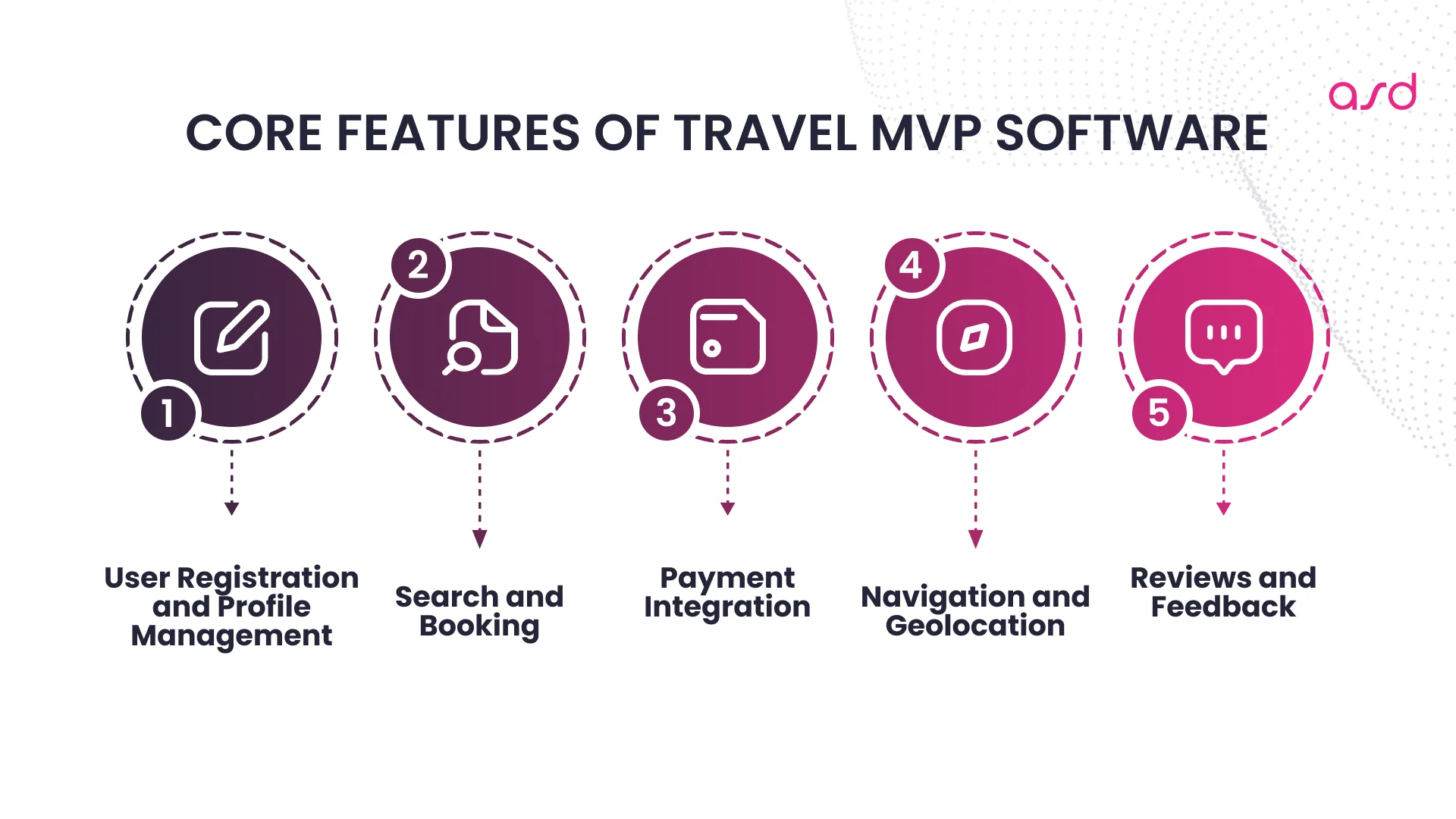 How to Prioritize Features for MVP
How to Prioritize Features for MVP
When you try to create MVP for travel, feature prioritization is essential in order to concentrate on the core aspects that are most beneficial for your product. Going by Airbnb, it is, however, important to begin with understanding the central problem that your MVP attempts to address, as well as isolating some of its most relevant features during in-house vs outsourcing team work.
To prioritize MVP features:
- Start by conducting market research, surveys, or direct user feedback to get insights into user needs and preferences. By aligning your feature set with the primary pain points and desires of your target audience, you ensure that the MVP delivers immediate value and attracts early adopters.
- Consider whether it is feasible in terms of MVP travel development time, cost, and complexity. In the competitive landscape to prioritize those that could offer unique advantages or differentiation.
- Focus on those features that validate your product and meet business goals.
When learning how to prioritize features for MVP, they should be considered in terms of user alignment, feasibility assessment, and competitive positioning. This strategic approach helps prioritize features for MVP effectively and ensures that your product meets its core objectives while remaining adaptable for future enhancements. By maintaining top-notch standards in services and training, you can surpass typical industry expectations and provide exceptional value to your users.
Let’s talk about your project? Feel free to ask any additional questions you might have. Our experts will be glad to assist you.

Security and Simplicity
MVP Travel prioritizes the security and simplicity of its travel apps, ensuring that clients can book and plan their trips with confidence. The company’s apps use the latest security protocols and encryption methods to protect client data and prevent unauthorized access. Designed to be user-friendly and easy to navigate, the apps feature a simple and intuitive interface that makes it easy to find and book trips.
The company’s apps also provide a high level of transparency, with clear and concise information about trip details, costs, and cancellation policies. MVP Travel’s commitment to security and simplicity is reflected in its attention to detail and dedication to providing a world-class user experience. The apps are regularly updated and maintained to ensure they remain secure and functional, with minimal downtime or disruptions.
By prioritizing security and simplicity, MVP Travel can provide its clients with a stress-free and enjoyable travel experience, from planning to departure. With MVP Travel’s apps, clients can focus on what matters most – creating unforgettable memories with family and friends, rather than worrying about the details of their trip.
Looking for a partner to develop MVP for Travel industry?
Development Process and Launching
1. Set the Design
Design is not only about how something looks but also how it works. For travel apps, ease of use and performance are the main design considerations. Depending on the kind of travel app you are building, such as travel planning, navigation, booking, or review apps, design requirements will differ. Ensure that your MVP contains essential user experience-enhancing design features.
2. Methods and Tools
The right tech stack and development method should be chosen meticulously. Do not let your product’s capabilities be restrained by available expertise. Instead, base your choice of technology on the idea that you have in mind. Involve your tech partner in order to choose the best tools and methodologies that align with your product vision and allow scalability.
3. Develop and Test
Develop and test your MVP once you have known your market segment, product idea as well as required features. This stage will involve coding and integration of selected technologies used coupled with thorough testing to ascertain if the product functions as intended. Be very keen on user testing so that you get feedback that will be beneficial for improvement purposes.
Once your travel MVP is validated, the next question is how to scale and move forward. We break down the next steps in “What Comes After MVP”.
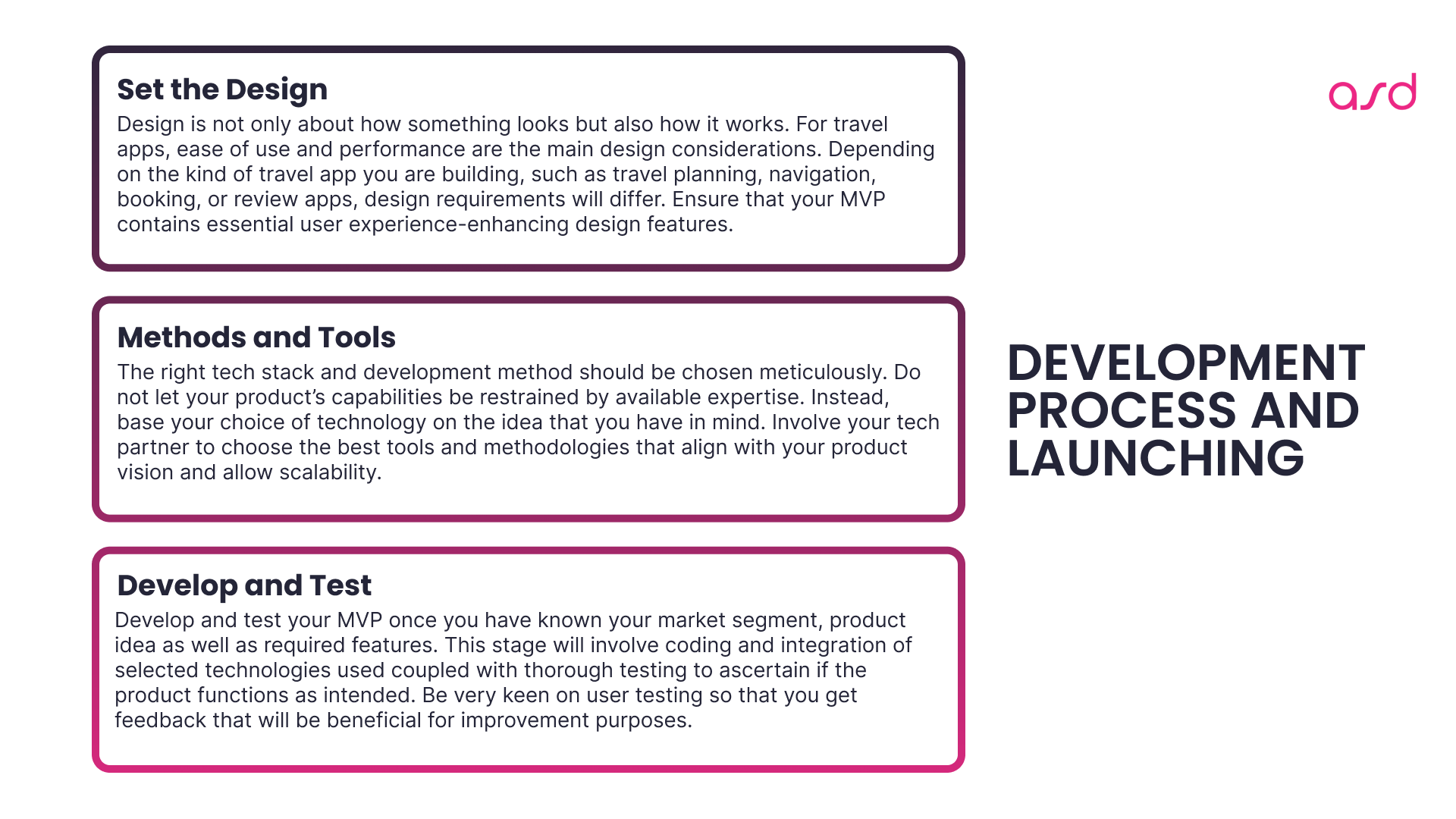
Common Challenges and Solutions
Developing an MVP for the travel industry comes with its own set of challenges:
- Complex Integrations. Travel apps often require integrations with third-party services like payment gateways and booking systems. Ensure these integrations are seamless and secure.
- User Experience. Poor performance can drive users away. Focus on optimizing the app’s performance and usability.
- Data Security. Protect user data by implementing robust security measures.
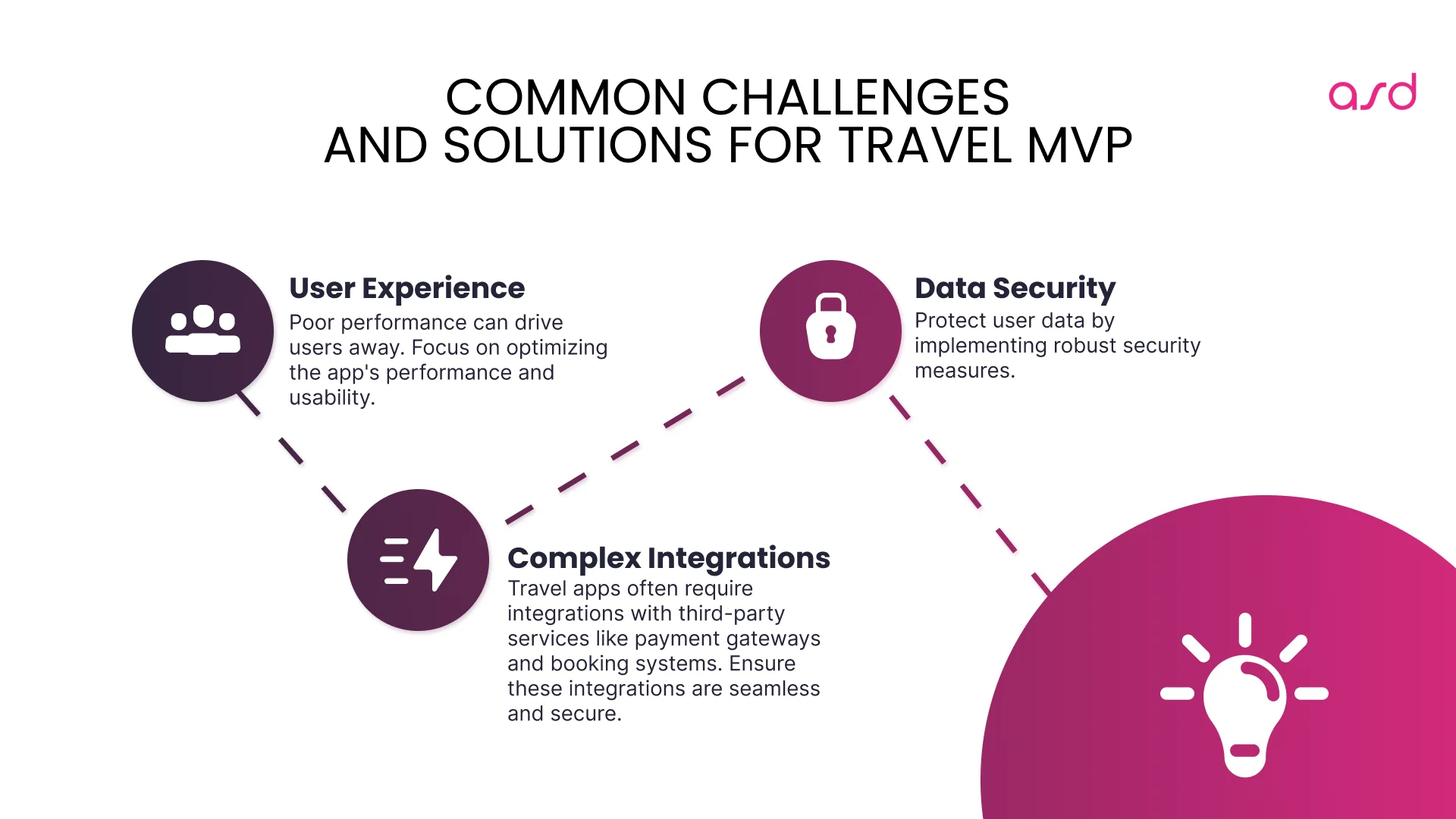
What should I know before hiring the right team for the development MVP for travel?
Hiring the right team is crucial for the success of your MVP for travel with some key considerations:
- Experience and Expertise. Look for a team with experience in developing travel apps and expertise in the necessary technologies.
- Communication. Ensure effective communication channels to stay updated on the project’s progress.
- Portfolio. Review their previous work to assess their capabilities and quality of work.
- Client Reviews. Check client reviews and testimonials to gauge their reliability and performance.
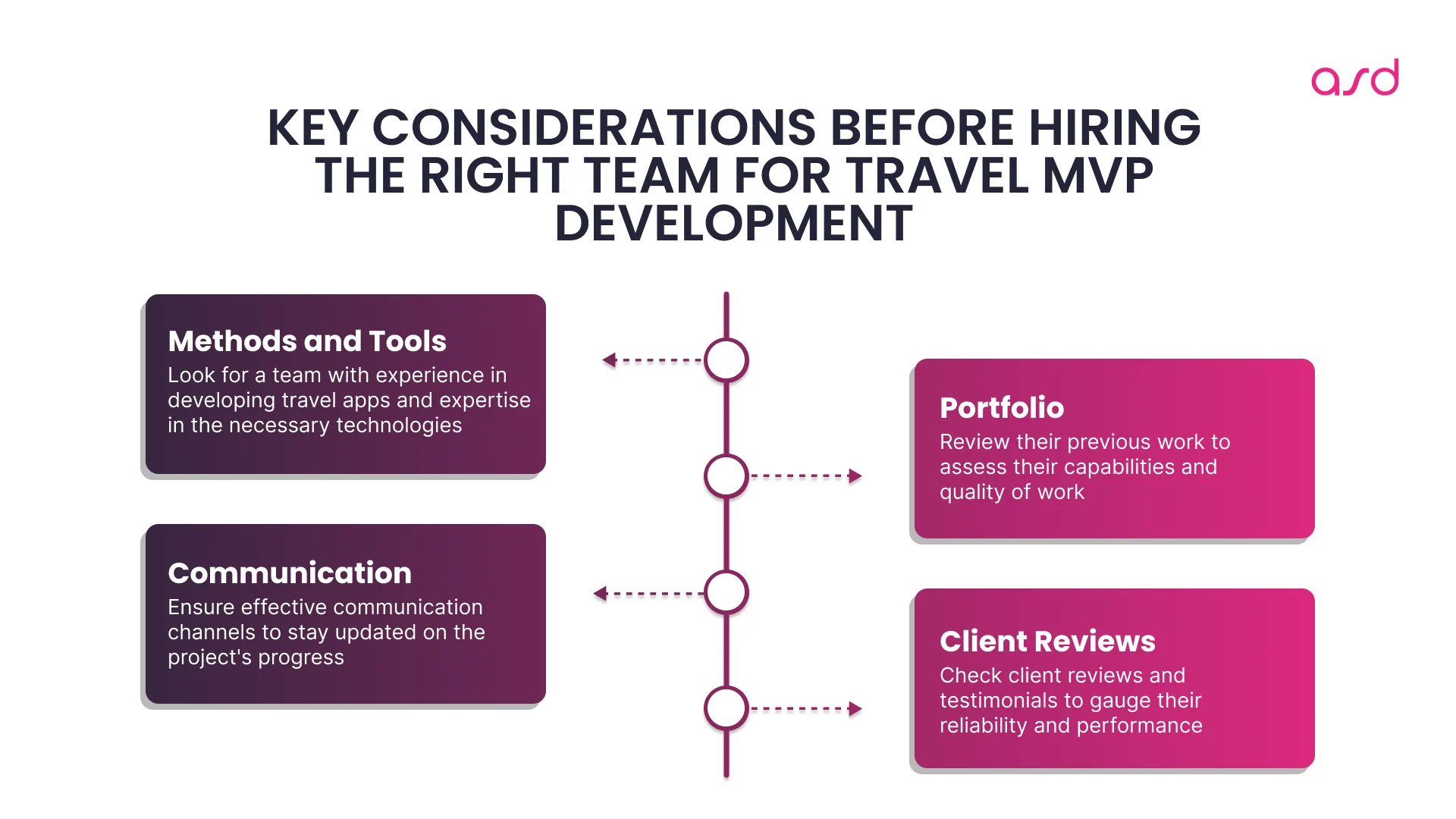 Conclusion
Conclusion
Developing a Minimum Viable Product (MVP) is a strategic step in bringing your travel product to market. It allows you to test core functionalities and gather essential user feedback without the need for a fully developed product. This approach helps in validating your concept, minimizing risks, and ensuring that you meet the real needs of your target audience, it truly should be one of the first steps in your software development plan. Moreover, in the realm of OTA software development, an MVP can provide valuable insights into user preferences and behaviors, which are crucial for fine-tuning and enhancing the overall user experience. By focusing on an MVP, you can streamline your development process and increase your chances of success in the competitive travel industry. Thanks to the tips and support provided, many clients have expressed their gratitude for the memorable experiences facilitated by a well-developed MVP.
An MVP in travel is a basic version of a travel app with essential features for early users. It tests the product idea and helps make better decisions for the final launch.
An MVP for travel lets you test your idea, and save time and money by focusing on core features, gathering user feedback, and identifying defects early, reducing risks.
When creating travel MVP software, React.JS, Angular, or Vue.js are usually used for the front-end part, while the back end can be made using Node.js, Django or Ruby on Rails and databases such as MySQL, PostgreSQL, or MongoDB. Stripe and PayPal process payments while Google Maps API or Mapbox is used for geolocation services.
Key steps involve feature definition, market research, and design prototyping, where a technology stack is chosen to create MVP for travel, then build and test it before releasing it to a small group of users who give feedback that will improve its functionality.
Essential features include user profile registration, secure payment, map services with directions, and rating options for feedback.
The challenges include integrating third-party payment gateways, ensuring app performance, protecting user data, scaling for future growth, and meeting regulatory compliance are quite helpful when you need to know how to develop MVP for hospitality.
Yes, building an MVP for a niche segment can be beneficial, offering unique features for a targeted audience, high conversion rates, and precise customer feedback.
Questions? Answers!
What is an MVP in the context of travel?
An MVP in travel is a basic version of a travel app with essential features for early users. It tests the product idea and helps make better decisions for the final launch.
Why should I develop an MVP for a travel business?
An MVP for travel lets you test your idea, and save time and money by focusing on core features, gathering user feedback, and identifying defects early, reducing risks.
What technologies are commonly used to build travel software MVPs?
When creating travel MVP software, React.JS, Angular, or Vue.js are usually used for the front-end part, while the back end can be made using Node.js, Django or Ruby on Rails and databases such as MySQL, PostgreSQL, or MongoDB. Stripe and PayPal process payments while Google Maps API or Mapbox is used for geolocation services.
What are the main stages of building an MVP for travel?
Key steps involve feature definition, market research, and design prototyping, where a technology stack is chosen to create MVP for travel, then build and test it before releasing it to a small group of users who give feedback that will improve its functionality.
What features are essential for a travel MVP?
Essential features include user profile registration, secure payment, map services with directions, and rating options for feedback.
What are the common challenges in developing an MVP for the travel and hospitality industry?
The challenges include integrating third-party payment gateways, ensuring app performance, protecting user data, scaling for future growth, and meeting regulatory compliance are quite helpful when you need to know how to develop MVP for hospitality.
Can I build an MVP for a niche travel segment?
Yes, building an MVP for a niche segment can be beneficial, offering unique features for a targeted audience, high conversion rates, and precise customer feedback.

